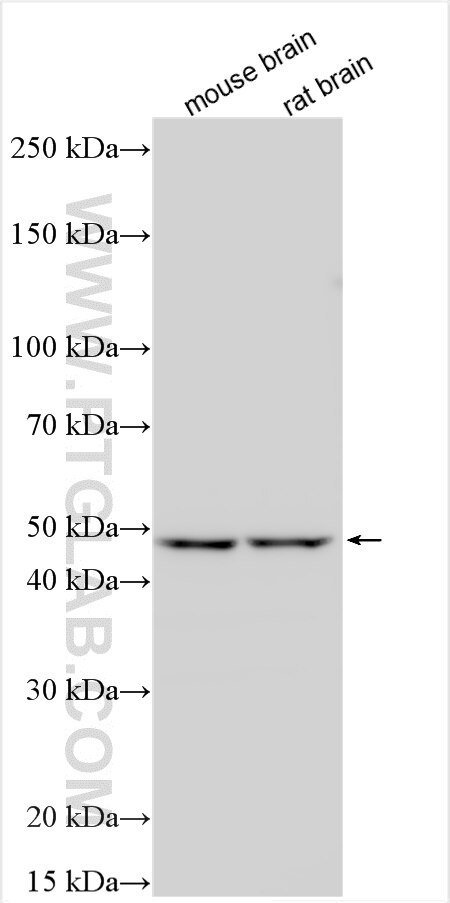Tested Applications
| Positive WB detected in | mouse brain tissue, rat brain tissue |
Recommended dilution
| Application | Dilution |
|---|---|
| Western Blot (WB) | WB : 1:500-1:3000 |
| It is recommended that this reagent should be titrated in each testing system to obtain optimal results. | |
| Sample-dependent, Check data in validation data gallery. | |
Product Information
25268-1-AP targets ORP1L in WB, ELISA applications and shows reactivity with human, mouse, rat samples.
| Tested Reactivity | human, mouse, rat |
| Host / Isotype | Rabbit / IgG |
| Class | Polyclonal |
| Type | Antibody |
| Immunogen | Peptide Predict reactive species |
| Full Name | oxysterol binding protein-like 1A |
| Calculated Molecular Weight | 108 kDa |
| Observed Molecular Weight | 50 kDa, 105-110 kDa |
| GenBank Accession Number | NM_018030 |
| Gene Symbol | OSBPL1A |
| Gene ID (NCBI) | 114876 |
| RRID | AB_3669468 |
| Conjugate | Unconjugated |
| Form | Liquid |
| Purification Method | Antigen affinity purification |
| UNIPROT ID | Q9BXW6 |
| Storage Buffer | PBS with 0.02% sodium azide and 50% glycerol, pH 7.3. |
| Storage Conditions | Store at -20°C. Stable for one year after shipment. Aliquoting is unnecessary for -20oC storage. 20ul sizes contain 0.1% BSA. |
Background Information
ORP1L (Oxysterol-binding protein-related protein 1L) is a lipid transfer protein that belongs to the family of OSBP-related proteins (ORPs). It is recruited to lysosomes via its ankyrin repeat domains that bind to Rab7(PMID: 34504082). ORP1L also possesses an FFAT motif, which allows it to interact with the ER resident VAP proteins to aid in establishing the ER-lysosomes contacts. ORP1L is expressed in various tissues, with particularly high expression in the brain, lungs, and macrophages. ORP1L plays a crucial role in cholesterol homeostasis. Disruption of ORP1L function can lead to a block in cholesterol transport to the ER, resulting in the accumulation of cholesterol-enriched LELs in the Golgi/perinuclear region. This can disrupt cellular cholesterol balance, potentially contributing to various metabolic diseases. This suggests that ORP1L is necessary for the normal functioning of cholesterol export from the endo-lysosomal system to the ER, and its dysfunction could be implicated in the progression of diseases related to cholesterol metabolism dysregulation(PMID: 28564600). The molecular weight of ORP1L is 50 kDa.
Protocols
| Product Specific Protocols | |
|---|---|
| WB protocol for ORP1L antibody 25268-1-AP | Download protocol |
| Standard Protocols | |
|---|---|
| Click here to view our Standard Protocols |



